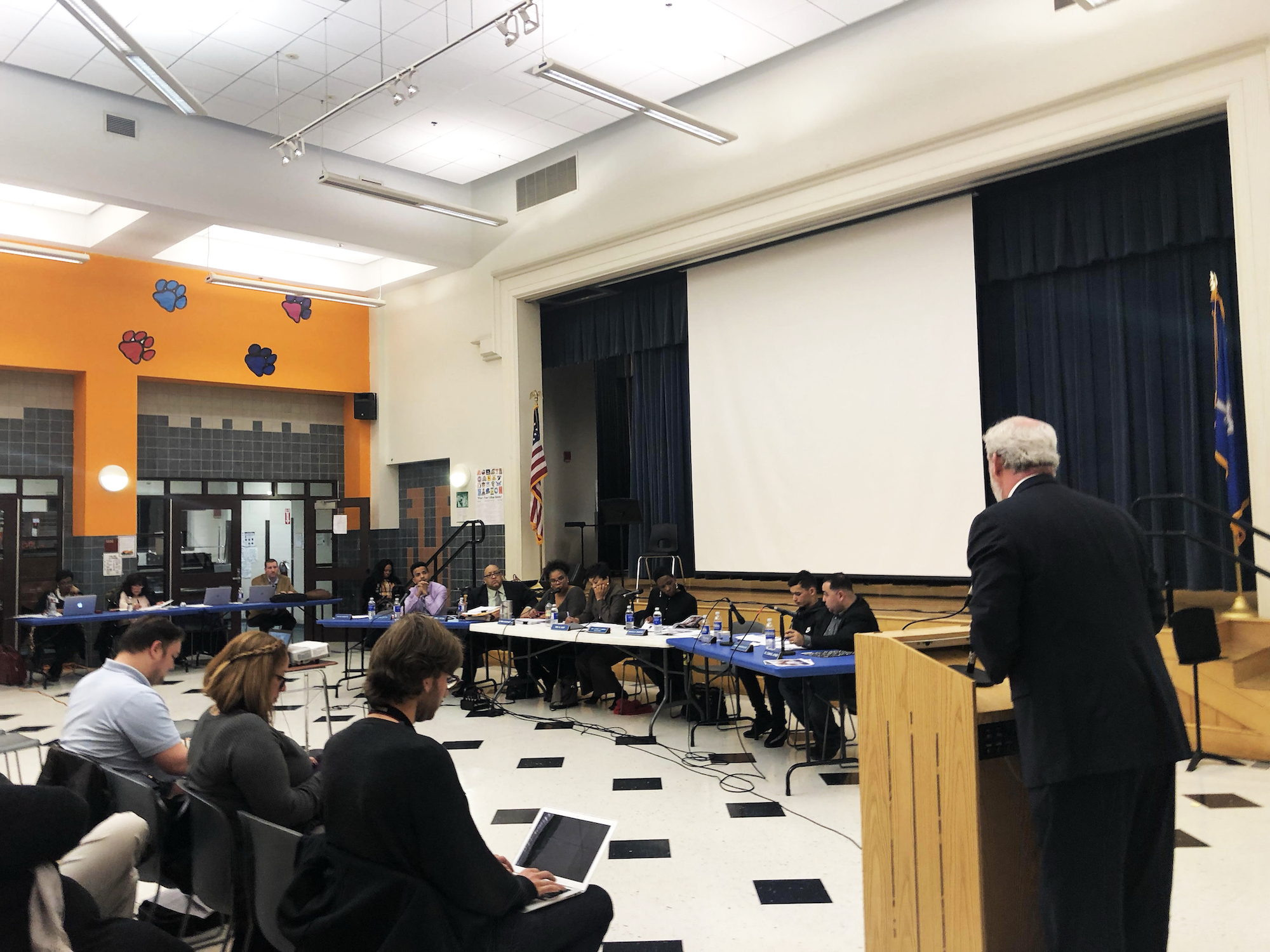
Carolyn Sacco
In the face of tough financial times, the Board of Education Finance and Operations Committee met Monday afternoon to discuss a variety of funding and budget matters.
At the sparsely attended meeting, members questioned — and at times sparred with — attendees on a variety of issues related to the allocation of funds for school-related services. Some agenda items, such as a presentation about the impact of local nonprofit New Haven Reads, were largely uncontroversial, while issues of hiring and contracting for services proved a tense discussion for board members and attendees alike.
“I thought we made some progress [on the issue of access to local contractors],” President Darnell Goldson said. “But we may have to do something special.”
New Haven Public Schools faces a multimillion-dollar deficit. While the district has managed to whittle the deficit for the current fiscal year from $8.9 million to $5.3 million, the city itself must absorb the remaining amount if the district cannot slash the deficit completely by June 30.
The board opened the meeting by hearing a report on this year’s numbers regarding ACES Open Choice, a program established by the state of Connecticut in which suburban students attend New Haven Public Schools and vice versa. The program focuses on reducing “isolation” — racial and otherwise — in New Haven County. New Haven received $612,698 for this current school year to aid the 194 students who attend city schools from outside New Haven.
But board members raised concerns over the program’s value to New Haven, questioning how much it costs the district to educate each student compared to the benefits it actually brings to residents of New Haven. Although representatives were unable to provide exact amounts, members of the board pointed out that Open Choice has disparately impacted minority schools. Financially burdened schools bear the cost of the transportation to bring in outside students.
Conversation shifted to other issues regarding education funding, including teacher retention. Mary Derwin, an administrator with New Haven Public Schools, presented a proposal on redirecting funds from other areas to post school year training in STEM for early education educators. Board members questioned spending on the training without a guarantee that those who had received the training would stay on in New Haven and reinvest their training in the local education system.
On both of the first two agenda items, the board asked for more information from district administrators going forward.
The challenges of a tight budget even showed in discussions of successful programs, such as New Haven Reads — a local literacy program founded in 2001. Board member Tamiko Jackson-McArthur highlighted that, in third grade, 60 percent of students in the city lag behind grade level. The board uniformly lauded New Haven Reads for its work, which involves one-on-one reading help for 152 students across multiple outposts in the city. Still, demand for such services far outpaces supply — the program currently has a 126-student waiting list.
Board members discussed if they could help the program expand its critical services and whether the current restriction was solely a matter of funding.
“This isn’t a waiting list for swimming or basketball,” Vice President Jamell Cotto said. “These kids want to read.”
But the most contentious part of the meeting surrounded issues that were not directly related to education or service provision for the system’s students. The public school system has repeatedly overspent its allotted budget in recent years. Concern over where dollars were spent — and how — seeped into agenda items, such as allocating funding for facilities repairs and spending $12,000 on hiring an individual to take on certain human resources responsibilities under the administration of Superintendent Carol Birks.
On the issue of construction and other contracted jobs, residents in attendance expressed frustration at the willingness of the city to renew contracts instead of allowing bids from various contractors.
Gregory Simpkins told board members that as a small business owner hoping to make bids, “everybody needs a chance” to bid for projects and contracts. Board members expressed their frustration that contract opportunities had not been publicized and made available to qualified business owners.
Birks, who was present at the meeting, initially sent two other administrators up to speak about relevant agenda items. But when the board began to press on why the administration was looking to spend $12,000 on someone who would do the duties that a fully staffed human resources department could handle. Birks stood firm that, though the individual had a connection to her transition committee, there was no “conflict of interest” and that the hiring was about a “highly skilled individual” who met specific needs.
New Haven Public Schools serves 21,552 students in the current school year.
Angela Xiao | angela.xiao@yale.edu
Interested in getting more news about New Haven? Join our newsletter!







